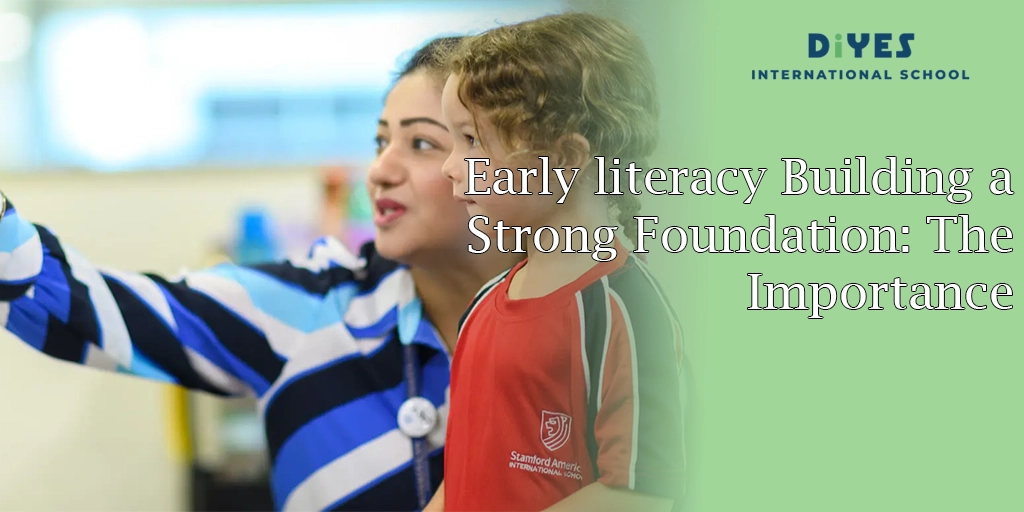DiYES International School – Early literacy forms the foundation for a child’s academic and personal development. The skills children develop early in reading and writing greatly influence their cognitive, social, and emotional growth. This article explores the importance of early , its impact on future success, and practical ways to foster it from a young age.
Table of Contents
- What is Early Literacy?
- The Impact of Early Literacy on Cognitive Development
- Why Early Literacy is Key to Academic Success
- Supporting Early Literacy at Home and in the Classroom
- Challenges in Promoting Early Literacy
- Conclusion
1. What is Early Literacy?
Early literacy involves the skills children acquire before they can read and write fluently. These skills include recognizing letters, understanding phonics, and expanding vocabulary. It also includes comprehension skills and the ability to engage with books and stories. From birth to age 5, a child’s brain develops rapidly. During this time, interactions with language shape their future skills.
Key Components of Early Literacy:
- Phonological Awareness: Recognizing and manipulating sounds in spoken language.
- Alphabet Knowledge: Identifying letters and their corresponding sounds.
- Vocabulary Development: Learning new words and their meanings.
- Print Awareness: Understanding how printed text works, such as reading left to right.
- Listening and Comprehension: Developing the ability to understand stories and follow narratives.
2. The Impact of Early Literacy on Cognitive Development
Early exposure to language and literacy experiences significantly influences cognitive development. Research shows that children who engage with books, storytelling, and meaningful conversations develop stronger cognitive abilities. These activities create brain connections that are crucial for learning.
Moreover, prepares children for higher-level thinking. It helps them develop the skills needed for analyzing, reasoning, and solving problems. As children enter school, they are better equipped to engage with complex texts and ideas. This foundation makes learning more accessible and enjoyable.
3. Why Early Literacy is Key to Academic Success
The link between early literacy and academic success is undeniable. Children with literacy skills perform better in school. Here’s why essential for academic achievement:
- Reading Proficiency: Children who read early grasp subjects like math and science more easily because these subjects require reading comprehension.
- Writing Skills: Early readers tend to develop strong writing skills. They understand how written language works and can express themselves clearly.
- Increased Confidence: A love for reading helps children approach learning with enthusiasm and self-assurance.
- Preventing Learning Delays: Early literacy reduces the risk of academic delays. Children with solid language skills enter school prepared to succeed.
READ MORE :Squid Game Season 2: Tanggal Rilis, Daftar Pemain, dan Hal Baru yang Perlu Anda Ketahui
4. Supporting Early Literacy at Home and in the Classroom
Both parents and educators play vital roles in promoting. Below are ways to support literacy development both at home and in the classroom:
At Home:
- Read Together Daily: Reading aloud to children daily builds vocabulary and comprehension skills. Engage with the story by asking questions and encouraging predictions.
- Encourage Storytelling: Allow children to tell their own stories. This enhances narrative skills and their understanding of story structure.
- Label Items: Label everyday objects around the home to increase print awareness.
- Sing Songs and Rhymes: Singing helps develop phonological awareness and an understanding of rhythm in language.
In the Classroom:
- Interactive Reading: Teachers should read aloud and interact with students by asking open-ended questions.
- Language-Rich Environment: Create a classroom filled with printed materials such as posters, labels, and charts. Encourage children to engage with text in meaningful ways.
- Hands-On Activities: Use games and activities to help children connect written language to their experiences.
5. Challenges in Promoting Early Literacy
While literacy is essential, several challenges can hinder its promotion. These include:
- Limited Access to Books: Some children lack access to books, limiting their exposure to language and print.
- Socioeconomic Barriers: Children from low-income families may not have the same opportunities for experiences. They may not have access to educational resources or language-rich environments.
- Digital Distractions: In today’s digital world, children often spend more time on screens than engaging in activities that promote literacy, like reading or conversing with adults.
Overcoming these challenges requires collaborative efforts from families, schools, and communities. Together, we can ensure that all children have the opportunity to develop literacy skills.
6. Conclusion
Early is crucial for a child’s long-term academic and personal success. By focusing on language skills from birth, children gain the cognitive abilities, confidence, and enthusiasm needed for learning. Parents and educators can help by fostering through everyday interactions, reading, and play. Investing in early is investing in a child’s future. By doing so, we prepare them for a lifetime of success.
